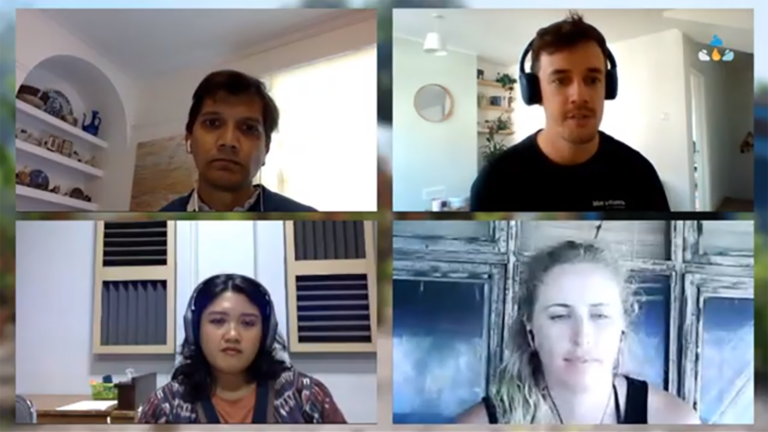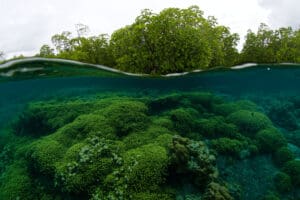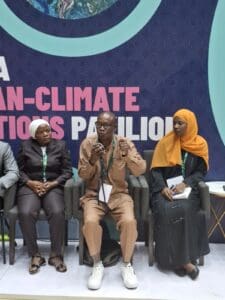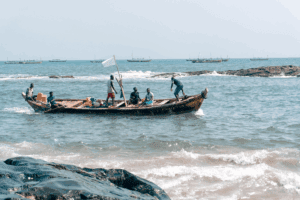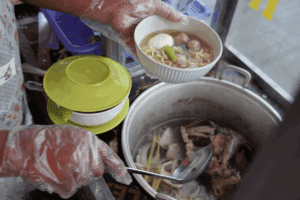The last edition of Toko Telo interactive online discussions facilitated by Blue Ventures welcomed experts from across the coastal tropics to discuss how community-based ecotourism can catalyse locally led marine protection. Laura Resti Kalsum of Stay Raja Ampat in Indonesia, Francesca Trotman of Love the Oceans in Mozambique, and Adrian Wells of Seventythree, shared their experiences of working in community-based ecotourism and in particular, the challenges facing the industry in 2020.
The event, which we hosted in collaboration with WWF’s Coastal Communities Initiative, consisted of two parts: a facilitated conversation and live questions with the expert panel, followed by group workshops in English and Bahasa Indonesia in order to gain a deeper understanding of the challenges faced and potential solutions to support community-based ecotourism and locally led marine conservation initiatives.
Love the Oceans: Our mission
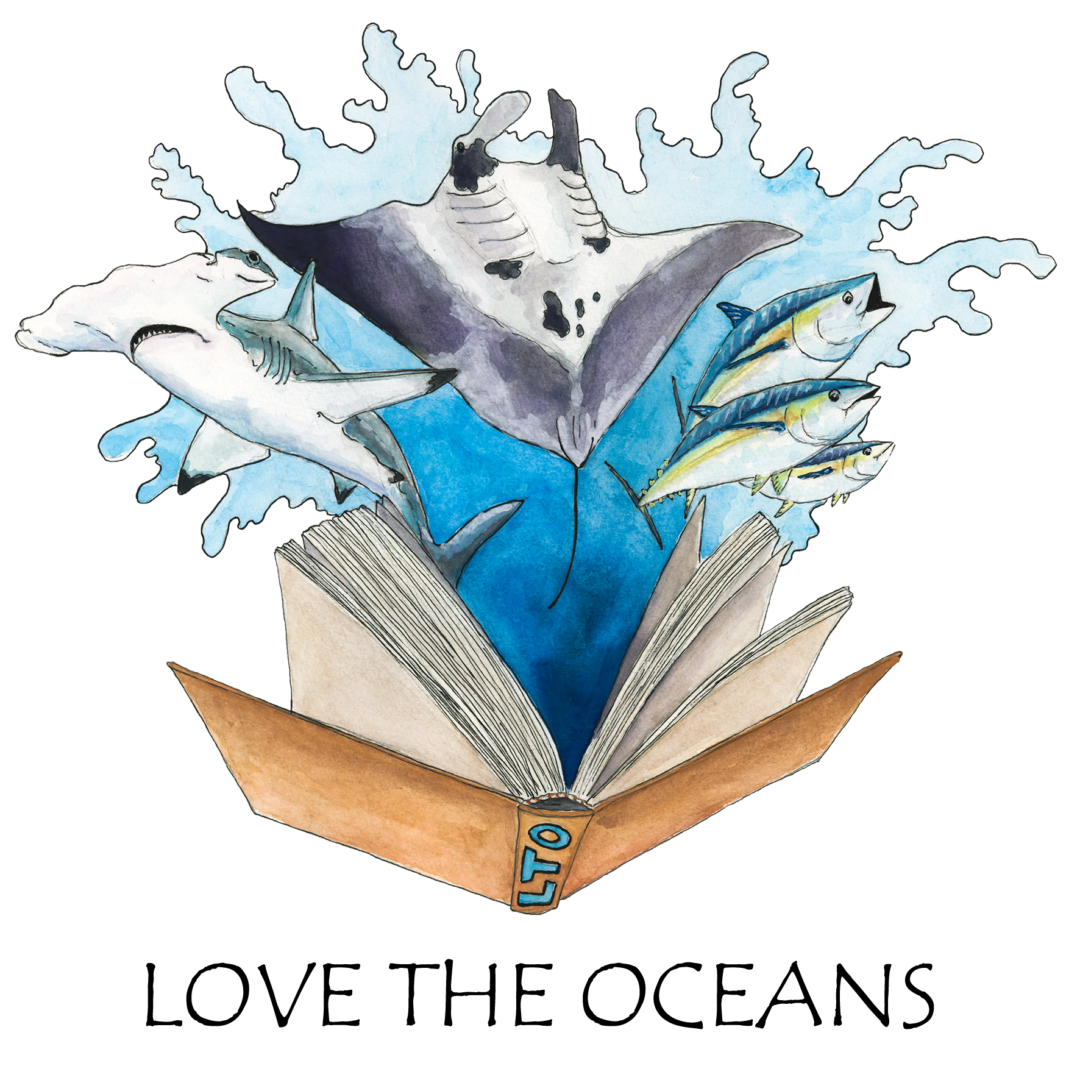 Francesca Trotman, Founder of Love the Oceans, kick started the event with a short presentation about the marine conservation expeditions programme that she runs in Jangamo Bay, Mozambique.
Francesca Trotman, Founder of Love the Oceans, kick started the event with a short presentation about the marine conservation expeditions programme that she runs in Jangamo Bay, Mozambique.
Francesca began by describing the mission of her small but impactful charity, which is to establish a marine protected area in Jangamo Bay and to engage the local communities in ocean conservation. The Love the Oceans team focus on three key approaches to achieving this goal: education (teaching fishers and local young people about the importance of protecting the ocean), research (collecting data to drive community action and legislation change) and sustainability (overcoming barriers and developing alternative income opportunities, including ecotourism).
The so-called ‘micro charity’ has achieved a great deal in the past five years, including teaching more than 1,150 children about the basics of the ocean, teaching 800 children to swim and raising money for a community pool, removing over one tonne of trash from the beaches and consistently collecting seasonal fisheries data for over six years.
Stay Raja Ampat: Community-led ecotourism in Raja Ampat: What are the benefits, what does it take and what is its future after COVID-19?
 Laura Resti Kalsum introduced Stay Raja Ampat as a company which is owned by PERJAMPAT, The Association of Indigenous Community Entrepreneurship and Livelihood in Raja Ampat (also known as the Raja Ampat Homestay Association). The association is managed by communities and is dedicated to improving the wellbeing of Raja Ampat’s indigenous communities on their own land, while restoring and sustaining the island’s unique ecosystems for future generations.
Laura Resti Kalsum introduced Stay Raja Ampat as a company which is owned by PERJAMPAT, The Association of Indigenous Community Entrepreneurship and Livelihood in Raja Ampat (also known as the Raja Ampat Homestay Association). The association is managed by communities and is dedicated to improving the wellbeing of Raja Ampat’s indigenous communities on their own land, while restoring and sustaining the island’s unique ecosystems for future generations.
This community-based model has had a major impact on the communities in Raja Ampat as members have shares in the company, with profits used to support programmes that improve their way of life and the ecosystems upon which they depend. Laura explained how the association’s hive of activity has drawn young people from the city of Waisai to the coastal villages for work, and how women in particular are developing a stronger position in society and experiencing increased financial independence.
Laura went on to describe the impact of COVID-19 on the homestay association here. Her team has seen an increasing dependence on natural resources, both marine and terrestrial, and more people have been considering selling their land to investors. However, the team also saw some positive changes – business owners took the time to repair their buildings and cultivate gardens to grow fruit and vegetables.
Stay Raja Ampat are hopeful that the area will quickly recover from COVID-19, once the Indonesian government reopens tourism. Laura believes that because the communities here have been able to build businesses with almost no support from the government or other institutions, they are unlikely to be broken by COVID-19.
“When local people start running a homestay business, they understand that land is a vital asset that must be protected. They start thinking ‘why do I need to sell this land when I could start my own business here and earn more money’?”
Seventythree: Key learnings around community-based ecotourism and homestays
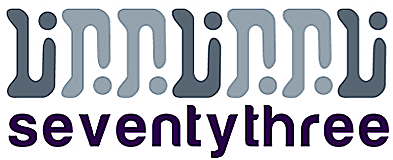 The final expert speaker, Adrian Wells of Seventythree, summarised his learnings from his extensive experience working in community organising and ecotourism. Seventythree is a social enterprise with an interest in local control over land and natural resources, and recently supported the development of a homestay toolkit with Blue Ventures and WWF, detailing their experience working with Stay Raja Ampat.
The final expert speaker, Adrian Wells of Seventythree, summarised his learnings from his extensive experience working in community organising and ecotourism. Seventythree is a social enterprise with an interest in local control over land and natural resources, and recently supported the development of a homestay toolkit with Blue Ventures and WWF, detailing their experience working with Stay Raja Ampat.
In 2012, Adrian Wells and his team at Seventythree began working with the communities in Raja Ampat to develop sustainable fisheries and agriculture, however they soon discovered that the communities were most motivated to try homestays as an alternative livelihood, due to previous experience in hospitality. As Adrian explained however, it was important to develop other alternative livelihoods around homestays, such as sustainable fishing and farming, in order to engage the entire community.
In his talk, Adrian described how the most important aspect of developing ecotourism as a livelihood for communities is to dedicate time, effort and expertise to developing strong community institutions to manage ecotourism businesses, like the Raja Ampat Homestay Association. These can be strengthened through building leadership capacity, teaching the importance of transparency and accountability, establishing rules and standards, and most importantly, facilitating conversations around community values. As Adrian explains, NGOs can’t be there forever and it is important not to create dependencies that cannot be sustained; communities must be enabled to take complete ownership of their businesses so that they remain valuable, lucrative and sustainable for years to come.
Following their presentations, the panellists continued to share their expertise in a live Q&A, which was then followed by breakout sessions, offering the chance for participants to learn more about the ways in which these organisations are working to overcome the challenges of the COVID-19 crisis impacting community-led ecotourism and how these communities are continuing to lead conservation efforts.
WWF’s Coastal Communities Initiative will be hosting a follow up event focussing on innovative finance mechanisms for marine tourism in early 2021.
You can watch the panel discussion here:
Learn about Blue Ventures’ homestays initiative
Explore this session and past sessions’ outputs and panel presentations
Find out more about Toko Telo
Thank you to our expert panellists, Laura Resti Kalsum, Francesca Trotman, Adrian Wells, our partners at WWF for their support in facilitating and to all who attended this interactive online discussion.

